| Listing 1 - 9 of 9 |
Sort by
|
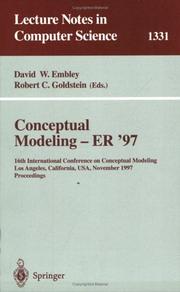
ISBN: 3540636994 9783540636991 Year: 1997 Volume: 1331
Abstract | Keywords | Export | Availability | Bookmark
 Loading...
Loading...Choose an application
- Reference Manager
- EndNote
- RefWorks (Direct export to RefWorks)
Database design --- Congresses --- Relational databases --- 681.3*D3 --- 681.3*D3 Programming languages --- Programming languages --- Conferences - Meetings --- Database design - Congresses. --- Relational databases - Congresses
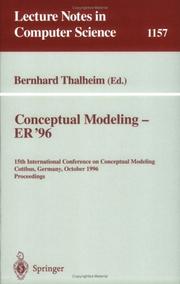
ISBN: 3540617841 9783540617846 Year: 1996 Volume: 1157 Publisher: Berlin [etc.] : Springer-Verlag,
Abstract | Keywords | Export | Availability | Bookmark
 Loading...
Loading...Choose an application
- Reference Manager
- EndNote
- RefWorks (Direct export to RefWorks)
Database design --- Relational databases --- -Relational databases --- -681.3*D3 --- Relational data bases --- Databases --- Data base design --- System design --- Congresses --- Programming languages --- Conferences - Meetings --- 681.3*D3 Programming languages --- 681.3*D3 --- Database design - Congresses. --- Relational databases - Congresses
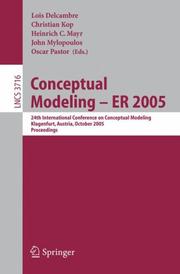
ISSN: 03029743 ISBN: 9783540293897 3540293892 3540320687 Year: 2005 Volume: 3716 Publisher: Berlin Springer
Abstract | Keywords | Export | Availability | Bookmark
 Loading...
Loading...Choose an application
- Reference Manager
- EndNote
- RefWorks (Direct export to RefWorks)
Conceptual modeling is fundamental to any domain where one must cope with complex real-world situations and systems because it fosters communication - tween technology experts and those who would bene?t from the application of those technologies. Conceptual modeling is the key mechanism for und- standing and representing the domains of information system and database - gineering but also increasingly for other domains including the new “virtual” e-environmentsandtheinformationsystemsthatsupportthem.Theimportance of conceptual modeling in software engineering is evidenced by recent interest in “model-drivenarchitecture”and“extremenon-programming”.Conceptualm- eling also plays a prominent rolein various technical disciplines and in the social sciences. The Annual International Conference on Conceptual Modeling (referred to as the ER Conference) provides a central forum for presenting and discussing current research and applications in which conceptual modeling is the major emphasis. In keeping with this tradition, ER 2005, the 24th ER Conference, spanned the spectrum of conceptual modeling including research and practice in areas such as theories of concepts and ontologies underlying conceptual m- eling, methods and tools for developing and communicating conceptual models, and techniques for transforming conceptual models into e?ective (information) system implementations. Moreover, new areas of conceptual modeling incl- ing Semantic Web services and the interdependencies of conceptual modeling with knowledge-based, logical and linguistic theories and approaches were also addressed.
Database design --- Relational databases --- 681.3*D2 --- 681.3*D2 Software engineering: protection mechanisms; standards--See also {681.3*K63}; {681.3*K51} --- Software engineering: protection mechanisms; standards--See also {681.3*K63}; {681.3*K51} --- Conferences - Meetings --- Database design - Congresses --- Relational databases - Congresses
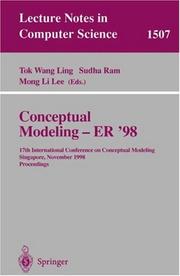
ISSN: 03029743 ISBN: 3540651896 9783540651895 354049524X Year: 1998 Volume: 1507 Publisher: Berlin Springer
Abstract | Keywords | Export | Availability | Bookmark
 Loading...
Loading...Choose an application
- Reference Manager
- EndNote
- RefWorks (Direct export to RefWorks)
Database design --- -Relational databases --- -681.3*D3 --- Relational data bases --- Databases --- Data base design --- System design --- Congresses --- Programming languages --- Conferences - Meetings --- Relational databases --- Computer Science --- Engineering & Applied Sciences --- 681.3*D3 Programming languages --- Computer science. --- Data structures (Computer science). --- Mathematical logic. --- Computers. --- Database management. --- Computer simulation. --- Computer Science. --- Simulation and Modeling. --- Data Structures, Cryptology and Information Theory. --- Database Management. --- Information Systems Applications (incl. Internet). --- Mathematical Logic and Formal Languages. --- Models and Principles. --- 681.3*D3 --- Computer modeling --- Computer models --- Modeling, Computer --- Models, Computer --- Simulation, Computer --- Electromechanical analogies --- Mathematical models --- Simulation methods --- Model-integrated computing --- Data base management --- Data services (Database management) --- Database management services --- DBMS (Computer science) --- Generalized data management systems --- Services, Database management --- Systems, Database management --- Systems, Generalized database management --- Electronic data processing --- Automatic computers --- Automatic data processors --- Computer hardware --- Computing machines (Computers) --- Electronic brains --- Electronic calculating-machines --- Electronic computers --- Hardware, Computer --- Computer systems --- Cybernetics --- Machine theory --- Calculators --- Cyberspace --- Algebra of logic --- Logic, Universal --- Mathematical logic --- Symbolic and mathematical logic --- Symbolic logic --- Mathematics --- Algebra, Abstract --- Metamathematics --- Set theory --- Syllogism --- Information structures (Computer science) --- Structures, Data (Computer science) --- Structures, Information (Computer science) --- File organization (Computer science) --- Abstract data types (Computer science) --- Informatics --- Science --- Data structures (Computer scienc. --- Data Structures and Information Theory. --- Application software. --- Application computer programs --- Application computer software --- Applications software --- Apps (Computer software) --- Computer software --- Database design - Congresses --- Relational databases - Congresses
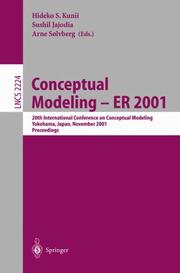
ISSN: 03029743 ISBN: 3540428666 9783540428664 3540455817 Year: 2001 Volume: 2224 Publisher: Berlin Springer
Abstract | Keywords | Export | Availability | Bookmark
 Loading...
Loading...Choose an application
- Reference Manager
- EndNote
- RefWorks (Direct export to RefWorks)
This book constitutes the refereed proceedings of the 20th International Conference on Conceptual Modeling, ER 2001, held in Tokohama, Japan, in November 2001. The 45 revised full papers presented together with three keynote presentations were carefully reviewed and selected from a total of 197 submissions. The papers are organized in topical sections on spatial databases, spatio-temporal databases, XML, information modeling, database design, data integration, data warehouse, UML, conceptual models, systems design, method reengineering and video databases, workflows, web information systems, applications, and software engineering.
Database design --- Relational databases --- Computer Science --- Engineering & Applied Sciences --- 681.3*I --- Relational data bases --- Databases --- Data base design --- System design --- Computing methodologies --- Conferences - Meetings --- 681.3*I Computing methodologies --- Computer science. --- Software engineering. --- Data structures (Computer science). --- Computers. --- Database management. --- Computer simulation. --- Computer Science. --- Data Structures, Cryptology and Information Theory. --- Simulation and Modeling. --- Database Management. --- Information Systems Applications (incl. Internet). --- Models and Principles. --- Software Engineering. --- Computer modeling --- Computer models --- Modeling, Computer --- Models, Computer --- Simulation, Computer --- Electromechanical analogies --- Mathematical models --- Simulation methods --- Model-integrated computing --- Data base management --- Data services (Database management) --- Database management services --- DBMS (Computer science) --- Generalized data management systems --- Services, Database management --- Systems, Database management --- Systems, Generalized database management --- Electronic data processing --- Automatic computers --- Automatic data processors --- Computer hardware --- Computing machines (Computers) --- Electronic brains --- Electronic calculating-machines --- Electronic computers --- Hardware, Computer --- Computer systems --- Cybernetics --- Machine theory --- Calculators --- Cyberspace --- Information structures (Computer science) --- Structures, Data (Computer science) --- Structures, Information (Computer science) --- File organization (Computer science) --- Abstract data types (Computer science) --- Computer software engineering --- Engineering --- Informatics --- Science --- Data structures (Computer scienc. --- Data Structures and Information Theory. --- Application software. --- Application computer programs --- Application computer software --- Applications software --- Apps (Computer software) --- Computer software --- Database design - Congresses --- Relational databases - Congresses
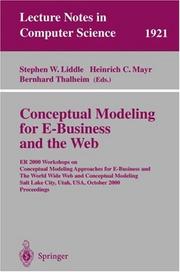
ISSN: 03029743 ISBN: 3540410732 9783540410737 3540453946 Year: 2000 Volume: 1921 Publisher: Berlin, Heidelberg : Springer Berlin Heidelberg : Imprint: Springer,
Abstract | Keywords | Export | Availability | Bookmark
 Loading...
Loading...Choose an application
- Reference Manager
- EndNote
- RefWorks (Direct export to RefWorks)
The objective of the workshops associated with the ER2000 19th International Conference on Conceptual Modeling was to give participants the opportunity to present and discuss emerging, hot topics, thus adding new perspectives to conceptual modeling. This attracts communities which have begun to or which have already recognized the importance of conceptual modeling for solving their problems. To meet this objective, we selected the following two topics: { Conceptual Modeling Approaches for E-Business (eCOMO2000) aimed at studying the application of conceptual modeling techniques speci cally to e-business. { The World Wide Web and Conceptual Modeling (WCM2000) which analyzes how conceptual modeling can help address the challenges of Web devel- ment, management, and use. eCOMO2000 is the rst international workshop on Conceptual Modeling - proaches for E-Business. It was intended to work out and to discuss the actual state of research on conceptual modeling aspects and methods within the realm of the network economy, which is driven by both traditionally organized ent- prises and dynamic networks. Following the philosophy of the ER workshops, the selection of eCOMO contributions was done very carefully and restrictively (six accepted papers out of thirteen submissions) in order to guarantee an excellent workshop program. We are deeply indebted to the authors and to the members of the program committee, whose work resulted in this outstanding program.
Database design --- Relational databases --- Computer Science --- Engineering & Applied Sciences --- Computer science. --- Information technology. --- Business --- Computer communication systems. --- Database management. --- Information storage and retrieval. --- System theory. --- Computer Science. --- Database Management. --- Computer Communication Networks. --- Systems Theory, Control. --- Information Systems Applications (incl. Internet). --- Information Storage and Retrieval. --- IT in Business. --- Data processing. --- Systems, Theory of --- Systems science --- Science --- Data base management --- Data services (Database management) --- Database management services --- DBMS (Computer science) --- Generalized data management systems --- Services, Database management --- Systems, Database management --- Systems, Generalized database management --- Electronic data processing --- Communication systems, Computer --- Computer communication systems --- Data networks, Computer --- ECNs (Electronic communication networks) --- Electronic communication networks --- Networks, Computer --- Teleprocessing networks --- Data transmission systems --- Digital communications --- Electronic systems --- Information networks --- Telecommunication --- Cyberinfrastructure --- Network computers --- IT (Information technology) --- Technology --- Telematics --- Information superhighway --- Knowledge management --- Informatics --- Philosophy --- Distributed processing --- Systems theory. --- Information storage and retrieva. --- Information storage and retrieval systems. --- Automatic data storage --- Automatic information retrieval --- Automation in documentation --- Computer-based information systems --- Data processing systems --- Data storage and retrieval systems --- Discovery systems, Information --- Information discovery systems --- Information processing systems --- Information retrieval systems --- Machine data storage and retrieval --- Mechanized information storage and retrieval systems --- Computer systems --- Electronic information resources --- Data libraries --- Digital libraries --- Information organization --- Information retrieval --- Application software. --- Business—Data processing. --- Application computer programs --- Application computer software --- Applications software --- Apps (Computer software) --- Computer software --- Database design - Congresses --- Relational databases - Congresses
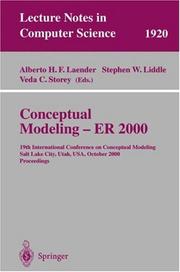
ISSN: 03029743 ISBN: 3540410724 9783540410720 3540453938 Year: 2000 Volume: 1920 Publisher: Berlin Springer
Abstract | Keywords | Export | Availability | Bookmark
 Loading...
Loading...Choose an application
- Reference Manager
- EndNote
- RefWorks (Direct export to RefWorks)
Database design --- Relational databases --- Computer Science --- Engineering & Applied Sciences --- 681.3*I --- Relational data bases --- Databases --- Data base design --- System design --- Computing methodologies --- Conferences - Meetings --- 681.3*I Computing methodologies --- Computer science. --- Computer communication systems. --- Mathematical logic. --- Database management. --- System theory. --- Computer Science. --- Computer Communication Networks. --- Systems Theory, Control. --- Popular Computer Science. --- Database Management. --- Information Systems Applications (incl. Internet). --- Mathematical Logic and Formal Languages. --- Systems, Theory of --- Systems science --- Science --- Data base management --- Data services (Database management) --- Database management services --- DBMS (Computer science) --- Generalized data management systems --- Services, Database management --- Systems, Database management --- Systems, Generalized database management --- Electronic data processing --- Algebra of logic --- Logic, Universal --- Mathematical logic --- Symbolic and mathematical logic --- Symbolic logic --- Mathematics --- Algebra, Abstract --- Metamathematics --- Set theory --- Syllogism --- Communication systems, Computer --- Computer communication systems --- Data networks, Computer --- ECNs (Electronic communication networks) --- Electronic communication networks --- Networks, Computer --- Teleprocessing networks --- Data transmission systems --- Digital communications --- Electronic systems --- Information networks --- Telecommunication --- Cyberinfrastructure --- Network computers --- Informatics --- Philosophy --- Distributed processing --- Systems theory. --- Application software. --- Application computer programs --- Application computer software --- Applications software --- Apps (Computer software) --- Computer software --- Database design - Congresses --- Relational databases - Congresses
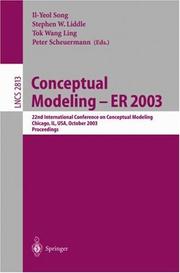
ISSN: 03029743 ISBN: 3540202994 9783540202998 3540396489 Year: 2003 Volume: 2813 Publisher: Berlin, Heidelberg : Springer Berlin Heidelberg : Imprint: Springer,
Abstract | Keywords | Export | Availability | Bookmark
 Loading...
Loading...Choose an application
- Reference Manager
- EndNote
- RefWorks (Direct export to RefWorks)
The 22nd International Conference on Conceptual Modeling (ER 2003) returned to Chicago after an absence of 18 years. Chicago, a city well known for its trendsetting and daring architecture, has met the new century with a renewed commitment to open public spaces and human interaction. Thus it provided a ?tting venue for ER 2003, the scope of which was expanded to encompass all aspects of conceptual modeling in order to deal with constantly changing information technology and business practices and to accommodate a new openness in connecting systems to each other and to human users. The ER 2003 Program Co-chairs, Il-Yeol Song, Stephen Liddle, and Tok Wang Ling, along with an outstanding Program Committee assembled one of the ?nest technical programs of this conference series. In keeping with the tradition of previous ER conferences, the program for ER 2003 also included four preconference workshops, two preconference tutorials, two conference tutorials, two panels, and a demos and poster session. The Program Co-chairs, ´ as well as Manfred Jeusfeld and Oscar Pastor (Workshop Co-chairs), Ee-Peng Lim and Tobey Teorey (Tutorial Co-chairs), Avigdor Gal and Elisa Bertino (Panel Co-chairs), and Heinrich Mayr (Demos and Poster Chair), deserve our appreciation for an excellent job. It was a pleasure working with all of them.
Database design --- Relational databases --- Computer science. --- Software engineering. --- Data structures (Computer science). --- Mathematical logic. --- Database management. --- Artificial intelligence. --- Computer Science. --- Data Structures, Cryptology and Information Theory. --- Database Management. --- Software Engineering. --- Mathematical Logic and Formal Languages. --- Information Systems Applications (incl. Internet). --- Artificial Intelligence (incl. Robotics). --- AI (Artificial intelligence) --- Artificial thinking --- Electronic brains --- Intellectronics --- Intelligence, Artificial --- Intelligent machines --- Machine intelligence --- Thinking, Artificial --- Bionics --- Cognitive science --- Digital computer simulation --- Electronic data processing --- Logic machines --- Machine theory --- Self-organizing systems --- Simulation methods --- Fifth generation computers --- Neural computers --- Data base management --- Data services (Database management) --- Database management services --- DBMS (Computer science) --- Generalized data management systems --- Services, Database management --- Systems, Database management --- Systems, Generalized database management --- Algebra of logic --- Logic, Universal --- Mathematical logic --- Symbolic and mathematical logic --- Symbolic logic --- Mathematics --- Algebra, Abstract --- Metamathematics --- Set theory --- Syllogism --- Information structures (Computer science) --- Structures, Data (Computer science) --- Structures, Information (Computer science) --- File organization (Computer science) --- Abstract data types (Computer science) --- Computer software engineering --- Engineering --- Informatics --- Science --- Data structures (Computer scienc. --- Data Structures and Information Theory. --- Artificial Intelligence. --- Application software. --- Application computer programs --- Application computer software --- Applications software --- Apps (Computer software) --- Computer software --- Database design - Congresses --- Relational databases - Congresses
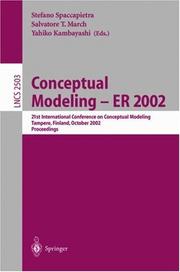
ISBN: 3540442774 3540458166 9783540442776 Year: 2002 Volume: 2503 Publisher: Berlin Springer
Abstract | Keywords | Export | Availability | Bookmark
 Loading...
Loading...Choose an application
- Reference Manager
- EndNote
- RefWorks (Direct export to RefWorks)
For more than 20 years, the series of Conceptual Modeling – ER conferences has provided a forum for research communities and practitioners to present and - change research results and practical experiences in the ?elds of database design and conceptual modeling. Throughout the years, the scope of these conferences has extended from database design and speci?c topics of that area to more u- versal or re?ned conceptual modeling, organizing originally weak or ill-structured information or knowledge in more cultured ways by applying various kinds of principles, abstract models, and theories, for di?erent purposes. At the same time, many technically oriented approaches have been developed which aim to facilitate the implementation of rather advanced conceptual models. Conceptual modeling is based on the process of conceptualization, and it is the core of system structuring as well as justi?cation for information systems development. It supports and facilitates the understanding, explanation, pred- tion, and reasoning on information and knowledge, and their manipulation in the systems, in addition to understanding and designing the functions of the systems. The conceptualization process aims at constructing concepts relevant for the knowledge and information system in question. Concepts in the human mind and concept descriptions in computerized information systems are quite di?erent things by nature, but both should be taken into account in conceptual modeling. Usually concept descriptions are properly observed, but concepts in the human mind and their properties are often neglected quite carelessly.
Database design --- Relational databases --- Database management: security; integrity; protection--See also {?681.5*E5} --- Mathematical logic: computability theory; computational logic; lambda calculus; logic programming; mechanical theorem proving; model theory; proof theory;recursive function theory--See also {681.3*F11}; {681.3*I22}; {681.3*I23} --- Knowledge representation formalisms and methods: frames and scripts; predicate logic; relation systems; representation languages; procedural and rule-based representations; semantic networks (Artificial intelligence) --- 681.3*I24 Knowledge representation formalisms and methods: frames and scripts; predicate logic; relation systems; representation languages; procedural and rule-based representations; semantic networks (Artificial intelligence) --- 681.3*F41 Mathematical logic: computability theory; computational logic; lambda calculus; logic programming; mechanical theorem proving; model theory; proof theory;recursive function theory--See also {681.3*F11}; {681.3*I22}; {681.3*I23} --- 681.3*H2 Database management: security; integrity; protection--See also {?681.5*E5} --- Computer science. --- Software engineering. --- Mathematical logic. --- Database management. --- Artificial intelligence. --- Computer simulation. --- Computer Science. --- Simulation and Modeling. --- Artificial Intelligence (incl. Robotics). --- Database Management. --- Information Systems Applications (incl. Internet). --- Mathematical Logic and Formal Languages. --- Software Engineering. --- Computer modeling --- Computer models --- Modeling, Computer --- Models, Computer --- Simulation, Computer --- Electromechanical analogies --- Mathematical models --- Simulation methods --- Model-integrated computing --- AI (Artificial intelligence) --- Artificial thinking --- Electronic brains --- Intellectronics --- Intelligence, Artificial --- Intelligent machines --- Machine intelligence --- Thinking, Artificial --- Bionics --- Cognitive science --- Digital computer simulation --- Electronic data processing --- Logic machines --- Machine theory --- Self-organizing systems --- Fifth generation computers --- Neural computers --- Data base management --- Data services (Database management) --- Database management services --- DBMS (Computer science) --- Generalized data management systems --- Services, Database management --- Systems, Database management --- Systems, Generalized database management --- Algebra of logic --- Logic, Universal --- Mathematical logic --- Symbolic and mathematical logic --- Symbolic logic --- Mathematics --- Algebra, Abstract --- Metamathematics --- Set theory --- Syllogism --- Computer software engineering --- Engineering --- Informatics --- Science --- 681.3*F41 --- 681.3*H2 --- 681.3*H4 --- 681.3*I24 --- 681.3*I --- 681.3*H4 Information systems applications (GIS etc.) --- Information systems applications (GIS etc.) --- 681.3*I Computing methodologies --- Computing methodologies --- Conferences - Meetings --- Artificial Intelligence. --- Application software. --- Application computer programs --- Application computer software --- Applications software --- Apps (Computer software) --- Computer software --- Database design - Congresses --- Relational databases - Congresses
| Listing 1 - 9 of 9 |
Sort by
|

 Search
Search Feedback
Feedback About UniCat
About UniCat  Help
Help News
News